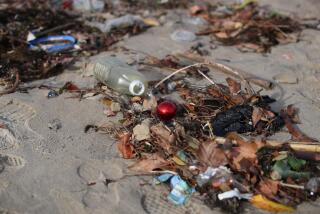Student Wraps Up Carcinogen Research
- Share via
CONWAY, Ark. — Claire Nelson was in the seventh grade when the thought occurred to her: Can cancer-causing particles seep into food covered with household plastic wrap while it is being microwaved?
“I thought it would be easy to test,” said Nelson, 18, a freshman at Hendrix College.
Motivated by her discovery that no one had done extensive research on plastic wraps before, Nelson decided to study the effects of radiation on carcinogens. Roughly six years later, she is receiving international accolades and meeting some of the most influential people in the scientific field.
Nelson had read that one of several suspected carcinogens--di(ethylhexyl)adepate, or DEHA--is in many plastic wraps, and that the Food and Drug Administration had never tested whether the carcinogen migrated into food being microwaved. That’s when she got her idea.
She microwaved plastic wrap in virgin olive oil, hoping to find that the carcinogens seeped into the oil. She found that, and more.
“I tested four different kinds of plastic wraps, and I found not just the carcinogens but also xenoestrogen was migrating, and that causes low sperm count in men and breast cancer in women,” Nelson said.
Getting to that point took discipline and determination.
At age 12, Nelson didn’t have the resources to undertake her research, so she set it aside.
“I had the idea, but I didn’t start to work on the project until the 10th grade,” when the promise of an automatic A in a science class revived it, she said.
“My teacher said if we made regionals in the science fair that we would get 10 bonus points. So I asked what we get if we make states, and she said 30 points. Then I asked what we get if we make internationals, and she said an automatic A,” Nelson said.
Without the equipment or facilities to get the job done, she started making phone calls. Many calls later, she got help from Jon Wilkes, a scientist at the National Center for Toxicological Research in Jefferson, southeast of Little Rock.
“Sometimes students who work with us come to us and ask for help with science projects. In her case it was different,” Wilkes said. “She had already done a fair amount of research, and she had already concluded that nobody had ever studied plastic wraps.”
Nelson, by then a junior at Hall High School, at first had her mother drive her 25 miles every couple of days from the family’s home in Little Rock to Jefferson. A year later, with her family moved to Mississippi and her living in an apartment in Little Rock, Nelson was making the trip by herself and balancing time between debate team competition and cheerleading.
Wilkes said it isn’t rare for nonscientists to come up with an idea like Nelson’s, but it is rare for them to actually pursue a way to test their theories. Wilkes and the toxicological research center, an arm of the FDA, let her run her experiments using government equipment.
“Sometimes she would be asleep standing up,” Wilkes said. “But she’d be there working--if there was no debate or basketball game to cheer at.”
Her research concluded, Nelson got her A.
“The first year I had specific evidence but not numbers. The second year I got the numbers,” said Nelson, whose family continues to live in Southaven, Miss., outside Memphis.
Her analysis found that DEHA was migrating into the oil at between 200 and 500 parts per million. The FDA standard is 0.05 parts per billion. Nelson couldn’t find any regulations concerning xenoestrogen, making it difficult to know how much is too much.
Her findings won her the American Chemical Society’s top science prize for students while she was a junior. Last year she was the salutatorian at Hall and placed fourth in the International Science and Engineering Fair in Fort Worth, Texas.
Recognition for her research continues as Nelson completes her freshman year at tiny Hendrix College in Conway. Her findings were published as a one-paragraph summary in several science journals, and submitted to others. Nelson also appeared in an advertisement in the March edition of Discover magazine, touting the international science fair.
“I went to Washington recently for the largest science conference in the world, and I got to meet Nobel Prize winners from all over the world,” she said.
Still, Nelson isn’t sure whether she wants to pursue a career in science.
“I’m undeclared right now,” she said of choosing a major. “I think I might want to get into broadcast journalism.”
In the meantime, she has lined up a summer job at America Online in New York, using an age-old connection to get her foot in the door.
“My boyfriend’s uncle got me the job,” she said.






